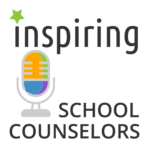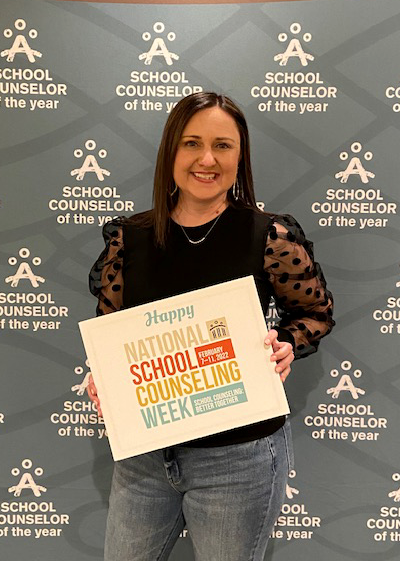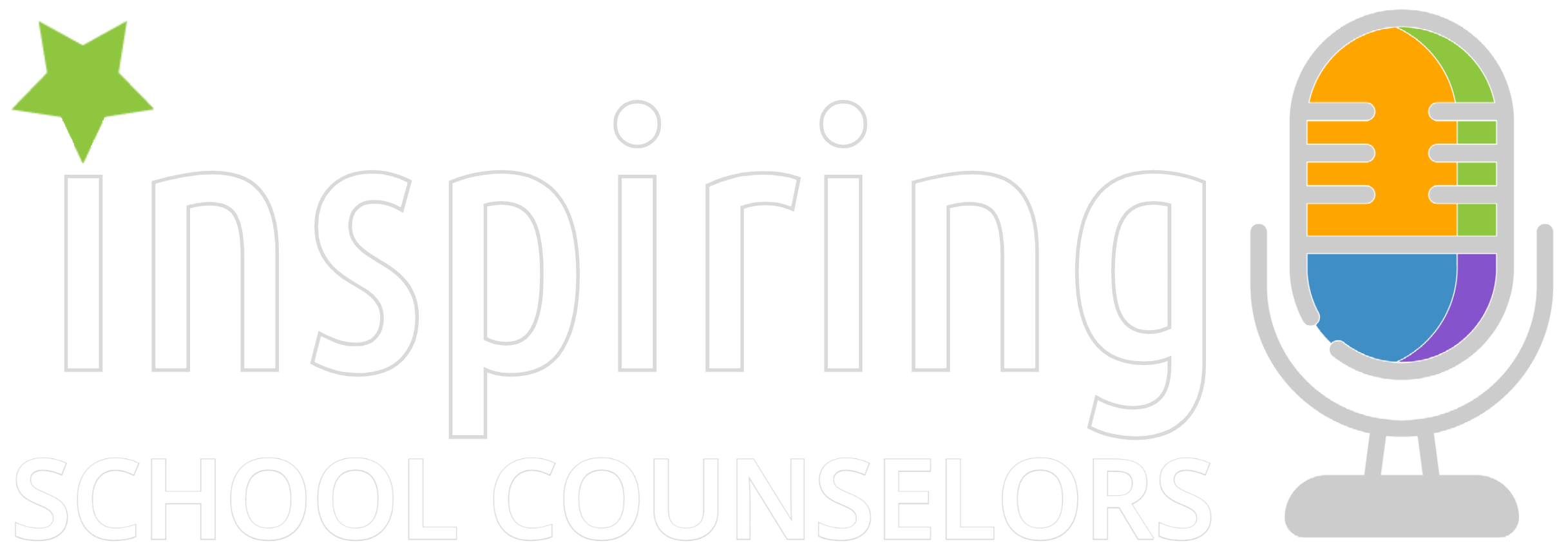Are school counselors too realistic or overly optimistic? This week we hear from Arizona School Counselor of the Year Kristina Guy who answers that question by believing ALL of her students are college capable but in need of guidance to ensure they consider multiple pathways to reach their end goals.

This Week's Storyteller
Kristina began her educational career in 2003 as an English teacher. In 2012 she moved to the counseling office. Kristina moved to West-MEC, a career and technical education school, in 2016 helping build her campus providing a competitive advantage to high school students.

Share YOUR Story!
 Do you have a touching or funny (or both) story about school counseling? We want to hear it! Drop us a line or record your story with our online Sound Booth.
Do you have a touching or funny (or both) story about school counseling? We want to hear it! Drop us a line or record your story with our online Sound Booth.
If you have questions or need help, let us know!
Subscribe
Encouraging Words for School Counselors is also available on these podcast apps and others. If you can’t find the podcast on your favorite app, let us know and we’ll make sure we get there. If you prefer to listen in your browser, visit https://inspiresuccess.org/podcast every week for a new episode. For new episode notifications and more, follow Inspire Success on Facebook, Instagram, or Twitter.
Transcript
Matt Fleck:
Spring break is upon us so some of you may be out enjoying some much-deserved time off this week. Wherever you are, cheers and welcome to the Encouraging Words for School Counselors podcast. I’m Matt Fleck with Inspire Success.
We have had a great time this winter talking with school counselors selected to be their state’s school counselor of the year. Arizona’s school counselor of the year is Kristina Guy, who is the Campus Counselor at the Western Maricopa Education Center or West-MEC Northwest campus in Surprise, Arizona. West-MEC is a public school district dedicated to providing innovative career and technical education or CTE programs to high school students, plus extensive, comprehensive school counseling services provided by Kristina Guy.
Kristina Guy:
We have what we call Discovery meetings. They are meetings with our junior students and parents or guardians where they come in and we talk about their pathway and the first question is not, “Where are you going to go?” but, “What are you going to do?” And then we talk about their end goal of the career and go backwards.
I’m a firm believer that every pathway after high school matters. We know that about 25% of the jobs in the United States require a bachelor’s degree or higher, but as a society, we push a hundred percent of the kids to go to a university. And so I’m a big proponent in making sure that they know what they want to do and then the education needed to get there.
Matt:
Kristina says If students say they’re going straight to university, she’s okay with that – that’s Plan A – but since life throws you curveballs, we’re going to look at a Plan B, a Plan C, all the way up to a Plan Z; whatever it takes to help them see there are multiple pathways to their end goal.
Kristina:
We need to make sure all of our kids are college and career ready, but I heard the term from another counselor where she said, we need to make sure all of our kids are college capable – not that they’re college and career ready because that doesn’t always mean the same thing, but that they’re college capable. So we have students in my auto program who take dual enrollment classes and they also work on cars. A lot of them want to be engineers and some of them just want to be mechanics, but we’re training them the same way.
I have students and they say, “Ms. Guy, I’m just going to be a mechanic.”
And so I say, “Well, first of all, take out the ‘just’ because there’s not a ‘just’ anything – you’re going to be a mechanic and that is fantastic. If things ever change and you want to go back to school later, we want to make sure that you’re prepared for that. So every pathway is viable from work to military, community college, trade school, university, all of the gamut. I want to make sure that you’re ready for all of it. So we’re going to prepare you like you can do any of that because when you’re done with this, you can do any of that.”
Matt:
Kristina reminded me that effective school counseling is as much about what we say, including the language we use, but also the impressions we leave with our students and families.
Kristina:
Just making sure all of our students are validated and not feeling shamed; that if a kid in high school says, “You know what, I really just want to stay home and raise my family,” that we say, “That’s fantastic. What can we do to help you be successful at that?”
I think by validating our students’ choices and not shaming them with things that they’re excited about, especially younger, that’s how you build campus culture. And we know campus culture is so important. There’s research that shows that a strong campus culture has decreased student violence, you know, that they feel more connected, that they have higher rates of achievement and graduation. So starting on something that seems so minor – validating their plan – can lead to a much bigger thing.
Matt:
Kristina has many stories of success from her work at West MEC, but one story that resonates with her began right when COVID hit.
Kristina:
When we went virtual, I think almost two years ago now, it was really hard for us. We’re hands-on school, so going virtual really hurt a lot of our kids more so, and with the other things, you know, that were kind of challenging for them, and having that relationship with some of my kids and just knowing when something was off, right?
So I’m sitting at home and I’m seeing attendance coming in, like, when they’re not logging in, and I’m seeing grades going down, and I’m just like, “Okay, this is not okay.” This isn’t normal for the student, you know, and reaching out by email with a generation that didn’t regularly check their email, now trying to get them to check their email and then write appropriate emails, um, was really hard.
Matt:
Many of you have probably experienced that same frustration – not being able to be front and center with your students – but having a sense that something isn’t going right.
Kristina:
I did have one student though that really just kind of dropped off and we’ve been emailing back and forth and I didn’t feel comfortable with his responses. I said, “You know, I really want to do a Zoom meeting where I can see you face to face. Um, I just want to make sure you’re okay.” And he said, all right. And so we did, and it’s the typical feeling right? When they’re on their meetings. So I’m looking at the ceiling and I’m like, “I’m not really seeing you. And I don’t need to see you the whole time. Like, I just want you to know that I’m thinking about you.” And it just seemed off.
Because of the meeting that I had had with him and his parents the prior year, in that discovery meeting, talking about pathways, and we had actually gone a bit further with him. He was really struggling in the school that he was in. He just couldn’t wake up and make it there, so we talked about an online school and he ended up switching, and then his grades went up, and so that was good. So I built that relationship already. And so I got off that [Zoom] meeting and I just said, something’s wrong.
So I immediately called Mom and I said, “Something’s wrong. Is he home alone today?” Which I knew he was because he had already said his older brother and younger sister weren’t there.
And she said, “No, nobody’s home. I’m at work. His dad’s on his way home.”
And I said, “You need to get home. Like, something’s off with him. He didn’t come right out and say that he’s gonna hurt himself, but he really, really alluded to it. And so I need somebody at that house soon.”
And so Dad got home within 30 minutes and yeah, he confided in them that he was having suicidal thoughts.
Matt:
The student was taken to be evaluated and diagnosed as bi-polar and suffering from depression, so Kristina kept in constant contact with the family.
Kristina:
Fast forward a year and a quarter when he completed our program and we have a recognition ceremony, very similar to graduation where they go through, and he finished the program, and he had a lot more challenges through last year as well, that kind of made finishing the program challenging. But at the very end Mom and Dad came up to me and Mom said, “Thank you so much for what you’ve done. If it weren’t for you, we wouldn’t be here today.”
And I go, “Oh, you know, we’re happy that you could come to the ceremony.”
And she goes, “No. He wouldn’t be here alive today if it weren’t for you.”
And it was just at that moment that I was just like, oh my gosh. Like, it’s so important to build that relationship with as many students – we know we can’t do it with all of them, but to try and help. And if you can help that one kid, because as a counselor, we know there’s no [worse] feeling than knowing that we didn’t intervene. And so I just knew through email that something was off and I don’t know how, you know, it was just kind of that counselor gut feeling, but going back to campus culture and building relationships, everything that’s really important to counselors.
Matt:
I know there are secondary counselors who feel it’s much better to “be realistic” with high school students, just tell them flat out if we don’t think they’ll make it in college or aren’t ready for that career. Maybe…but I fall into Ms. Guy’s camp.
Thanks to Kristina Guy for sharing her story with us this week. Remember, we’re always ready if you have a story or two of a school counseling experience that you would be willing to share with us. Find all the details at our website – inspiresuccess.org/podcast.
Thanks for listening, we’ll be back next week.
